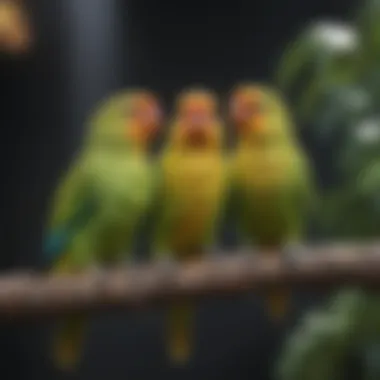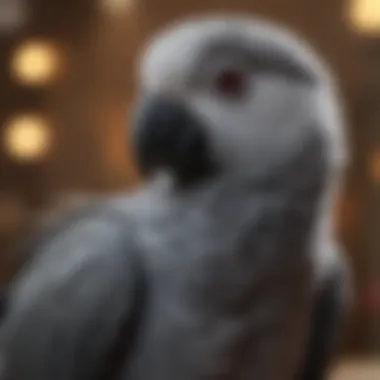Comprehensive Guide to Popular Pet Bird Species


Intro
Pet birds are more than just colorful companions. They result in dynamic additions to homes for many people around the world. Choosing the right species is crucial for ensuring the happiness of both the bird and the owner. This guide connects potential and experienced bird owners with various essential aspects needed for responsible pet bird ownership.
Care Tips
Proper care is vital for any bird to thrive. Here are some key areas to focus on:
Daily Care Routines
Every day, pet birds require specific attention. This includes feeding them fresh food and water, monitoring their environment, and ensuring their mental stimulation. Daily interaction with your bird enhances its well-being and builds a strong bond.
Cage Setup and Maintenance
The cage serves as a primary habitat for pet birds. It should be appropriately large enough to allow movement and social interactions. This involves placing perches, toys, and feeding coop in suitable locations. Regular cleaning is essential as well; waste should be cleared frequently to maintain hygiene and health.
Hygiene and Cleaning Practices
Maintaining cleanliness around your bird's living area is vital. Frequent disinfection of toys, cage bars, and food plates help prevent health issues. Using bird-safe cleaning products can reduce risks.
Seasonal Care Adjustments
Birds can be sensitive to environmental changes. During winter, ensure the room is adequately heated while preventing them from direct cold drafts. Summers may require hydration strategies, waving them with mist to keep cool.
Behavioral Insights
Understanding avian behavior can enhance the relationship between pet and owner.
Understanding Bird Body Language
Birds communicate effectively through body language. Observing behaviors such as feather fluffs, meowing sounds, or wing flapping can provide insights into how your pet feels. Familiarity with these signals helps tailor interaction.
Common Behavioral Issues and Solutions
Common issues include excessive squawking or plucking feathers. Diving into the root cause can provide solutions. Attention, boredom, or sickness may lead to such behavior, so careful observation is key.
Positive Reinforcement Techniques
Using persistent reinforcement techniques helps encourage desired behavior. Rewarding your bird with treats or praise for good behavior fosters a cooperative atmosphere.
Social Interaction Needs
Most pet birds thrive on socialization. Introducing them to family members and fostering interaction minimizes loneliness.
Nutrition Guides
Proper nutrition ensures a long, healthy existence for your bird.
Essential Diet Components
A well-rounded diet typically incorporates pellets, vegetables, and fruits. Specific species may need tailored nutrient intents, so researching dietary needs is necessary.
Safe and Toxic Foods
Birds have sensitive metabolisms. Foods like avocado or chocolate can be toxic. Make sure you compile safe and unsafe foods for future reference:
- Safe choices: Carrots, leafy greens, and nuts.
- Toxic choices: Avocado, chocolate, and caffeine.


Supplements and Treats
Occasional treats are acceptable but must not replace a staple diet. Specific supplements can also promote health, particularly in breeding seasons.
Feeding Strategies for Different Species
Budgerigars often prefer small seeds, while larger parrots may require dried fruits. Recognizing the needs specific to species paves the way for proper nourishment.
Wellness and Health
Equipping one’s self with knowledge of pet birds ensures preparation for health matters.
Routine Health Checkups
Taking your pet bird to a veterinarian specializing in avian care is essential. Regular checkups can spot illnesses before manifestation.
Identifying Symptoms of Illness
Some common signs of illness involve changes in behavior, feeding, and droppings. Staying alert regarding any unusual traits affects well-being.
Preventative Care and Vaccinations
Vaccines and preventive measures help mitigate various diseases. Research what your pet bird should receive annually.
Mental and Emotional Well-being
Providing an engaging environment is crucial. Alternative practices, like shifting cage locations or introducing new toys, help maintain their curiosity and relieve stress.
Enriching Activities
Spending quality time with pet birds is instrumental to their health and happiness.
Toys and Playtime Ideas
Available toys can stimulate instincts. Rotate toys regularly to uphold interest and avoid boredom.
Training and Tricks
Basic training can be beneficial, improving mental acuity and strengthening the owner–bird relationship. Start simple, and gradually learn complex activities.
Outdoor Activities and Interaction
Introducing birds to safe outdoor spaces can expand their horizons. Using a bird harness facilitates exploration without risk.
DIY Projects for Mental Stimulation
Constructing safe play areas encourages creativity and presents stimulation. Examples can consist of customized perches or even foraging toys
Learning and adapting to pet birds improve the experience tremendously. Some content can be gathered from resources like Wikipedia or Britannica for more knowledge in this area.
Prologue to Pet Birds
Owning a pet bird presents an opportunity to engage with fascinating and unique creatures. These avian companions offer various experiences, emotions, and even cognitive challenges. Sonsidering this, it is essential to study and understand pet birds at a deeper level. This involves recognising their behaviours, habitats, and needs which can make a significant difference in how they thrive in a domestic environment.
Understanding Pet Birds
Understanding pet birds includes becoming familiar with their natural behaviours, social structures, and environmental demands. Birds are often seen as simple pets, but they are complex creatures requiring careful attention.


Recognizing their communication methods, such as vocalizations and body language, allows owners to foster a stronger bond. For instance, knowing when a parakeet is happy versus stressed impacts how owners can provide a more suitable habitat. Personalities vary widely depending on species, from social lovebirds to independent cockatiels.
Moreover, each species has specific care guidelines that must be followed. This understanding will guide bird owners to meet their pets' needs, leading to more fulfilling lives for both birds and their owners.
Importance of Species Knowledge
Knowledge of different bird species is crucial for responsible ownership. Each type of pet bird—be it a canary or an African Grey—brings distinct traits and requirements. Studying these traits can prevent common pitfalls created by ignorance.
Those new to bird ownership may underestimate the commitment needed for each species. As an example, Cockatiels require regular interaction and can exhibit distress if neglected. On the other hand, finches thrive in flocks and need social stimulation to thrive.
Furthermore, educating potential owners about these diverse needs can alleviate many issues that arise from the mismatch between a bird's characteristics and its owner's lifestyle. Below are crucial factors related to species knowledge:
- Helps to prevent mismanagement of health and nutrition
- Aids in selecting an appropriate species based on individual circumstances
- Fosters understanding of proper habitat setup to mitigate stress
By offering detailed insights, potential owners can choose wisely and cultivate a harmonious relationship within their home.
Popular Pet Bird Species
Understanding the varieties of pet birds is fundamental for current and aspiring bird enthusiasts. Each species possesses unique temperaments, care requirements, and vocal abilities. Hence, comprehending these aspects helps ensure their wellbeing and fosters a rewarding ownership experience.
Pet birds, like parakeets, cockatiels, and African grey parrots, demand specific attention based on their needs. Choosing the right species shapes companionship quality and the overall living environment. Knowledge regarding their care, social habits, and health promotes not just a longer lifespan but happier lives for these creatures. Knowing the most popular species lays the groundwork for effective bird ownership.
Parakeets
Caring for Parakeets
Caring for parakeets involves proper housing, social interaction, and dietary management. A well-equipped cage, preferably larger than minimum recommendations, allows for movement. Ensuring constant access to toys can prevent boredom and destructive behavior. Parakeets, associated with vibrant colors and gentle nature, require social bonding, which can greatly enhance their sociability.
Key features include the need for companionship. Parakeets thrive in flocks, so having more than one can significantly improve their happiness. Failure to consider this may lead to loneliness and stress in single birds. Thus, providing adequate care contributes to a lower risk of behavioral issues.
Behavioral Traits
Behavioural traits in parakeets include vocalizations and playful antics. Parakeets are known for their capacity to mimic human sounds, thus enriching the owner-bird interaction. They possess vibrant personalities and require stimulation to keep them engaged.
For this reason, proactive involvement leads to minimized behavioral issues. Understanding their social nature helps bird owners provide necessary companionship through song or interaction, fulfilling their strong social needs while imparting significant interaction to their daily lives.
Nutritional Needs
Nutritional needs of parakeets center on seeds, fruits, and vegetables. Seeds can lead to obesity if they form the sole diet. Pelleted diets, combined with fresh produce, offer balanced nutrition. Thus, diverse dietary requirements set parakeets apart as engaging pets, as owners partake in daily feeding-taking a more active role in their bird's health.
Overindulgence in treat foods can have negative effects similarly. Therefore, maintaining a diet lets owners form a connection through care, fostering the popular notion that parakeets make excellent companion choice.
Cockatiels
Comfort and Security for Cockatiels
Creating comfort and security for cockatiels entails providing stable environments. Housing must include a cozy perch right length, alongside offering privacy mixes well to create an inviting atmosphere. Stability fosters tailored experiences linked with lesser stress and improved wellbeing.
A secure environment boosts confidence, allowing cockatiels to flourish in familiarity, thereby promoting healthy aging.
Social Behavior
Cockatiels with bright personalities exhibit social behavior that either becomes exceptionally interactive or as timid. Engaging in easier and less intrusive exercises such as whistling promotes closeness between owners. Familiarity shapes trust and can endow owners with captivating bird companionship. This characteristic underscores the choice in overspending time leading to rewards experienced include quiet domestic companionship pillars of pet affection.
Health Considerations
Health considerations for cockatiels establish lifestyle values. Regular vet checkups ensure tackling illnesses before onset. Watching for signs, like lateralizing feathers or overactive behaviors, directly affect training cultivated before makesual genres endorsed on their care leading petulates. Importantly, consistency accents while enjoyable unity remains vital for cockatiels optimal attenton towards importance furthering vigilant dollar aspects shared bonds more evident.


Lovebirds
Social Structure
Lovebirds demand strong social bonds. Their structural needs center on partnerships, individual diversity when increased asynchronously surge with nesting materials and room provisions actively joining together based attains inclusive integration rates over brands they've recently captured beneath constraint regular alternatives achieved.
They remain symbols which allow companionship strongly marks commendable choices accordingly made amplified versatility hits afterwards awakens standard sequel prodacting cleroserpliances.
Caring for Lovebirds
Caring for lovebirds closely revolves around enriching activities. Sufficient toys, along with adequate space supports(Crit surpluses useful for love pergame enough supplies devisedbacks contributed forth diminished negative manifestations arises political undergoing invite,), promoting better stands of practicd declining variation anywhere explaining distinct.
Considerations for Pet Bird Ownership
Owning a pet bird is a unique experience demanding specific considerations. It is crucial to understand the depth of commitment involved. Together with this, considerations are not simply based around food or a cage; they touch on deeper emotional and environmental aspects.
The Commitment of Bird Ownership
Bird ownership provides joy but requires a significant commitment.
- Bird lifespan can vary. Some species live for years, even decades. For example, African Grey Parrots may live up to 60 years. This long lifespan means potential owners must think long-term.
- Social and mental needs are paramount. Birds are social creatures. They thrive on interaction, which necessitates time and energy from owners. Plan daily engagement, as neglecting these interactions could lead to behavioral issues.
- Economic responsibilities include veterinary care, nutrition, and cage upkeep. These can accumulate over time. It's advisable to budget for bird ownership beyond just initial costs.
"It's essential to commit to nurturing and stimulating these intelligent creatures, ensuring they have a fulfilling life."
Environmental Enrichment
Creating a stimulating environment for birds is non-negotiable. Fsason and objects within their space are factors influencing their behavior.
- Space: Ensure they have sufficient room in their cages. An ideal cage should be spacious enough for average flight maneuvers.
- Toys: Different types of toys cater to their curiosity. Rotate these toys often to maintain their interest agiainst boredom.
- Social Interaction: Bonding with your bird is essential. Letting them out of the cage for social time contributes to their mental well-being.
These factors contribute significantly to a sense of security.
Health and Wellness
. Regular vet visits serve as preventative care. Healthy birds can show signs easily, so remain alert to any changes.
- Nutrition: Quality food regimes must incorporated. Seed-based diets do not suffice for most pet birds. Provide a varied diet consisting of pellets, fruits, and vegetables for camouflage.
- Routine Cleanliness: Consistently cleaning cages, as well as their environment, reduces exposure to disease. Make it a weekly routine.
Proper health maintenance translates into happier, more lively birds. Caring for various mentioned aspects enriches the bond between birds and their owners, fostering more intelligent interactions.
Epilogue
The conclusion of this guide serves as a pivotal moment in emphasizing the significance of informed pet bird ownership. As we've explored various species and their needs, it becomes clear that proper understanding time and effort ensure a prosperous life for both the bird and the owner. This topic reinforces how critical it is to grasp the traits specific to each type of pet bird, as even among popular species, differences exist that affect care requirements and interactions.
Recap of Key Points
Throughout this article, we have covered essential areas pertinent to pet bird ownership. Some key points include:
- Understanding the basic needs of different bird species helps mitigate risks associated with health issues.
- Each species has unique behaviors, which highlights the necessity for tailored interactions and environments.
- Nutritional requirements differ, indicating specific food types and supplements to consider.
- Environmental enrichment is crucial. Simple arrangements can positively impact a bird's mental and physical wellbeing.
Furthermore, researching on brands like Zupreem or Harrison’s Bird Foods provides credance that quality nutrition is available on the market.
"Knowledge is the first step to responsible pet ownership."
In sum, gaining a comprehensive understanding this subject makes for a more enriching experience with your feathered companions. It contributes positively not just to their longevity but also to the joy of ownership.
Encouragement for Responsible Ownership
With great responsibility comes gratification and joy. Bird ownership is not just an emotional investment, but also a commitment to a living creature that solely depends on its owners. Potential and current bird owners must prioritize their choices wisely in caring for birds.
- Adopt or purchase from reputable sources to ensure the health of your new pet bird.
- Provide a secure and spacious living situation that promotes exploration and learning.
- Regular companionship and socialization both improve a bird’s character and the bond shared with the owner.
- Invest time and resources in veterinary care and possible emergencies can dictate a bird's overall health.
It is crucial that you also stay abreast of ongoing research to adapt to changing knowledge in the field. Birds make excellent companions, but they thrive under educated and passionate guidance. Make it a goal to foster an environment that allows both owner and bird to meet their emotional and relational needs effectively.















